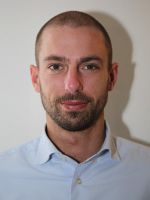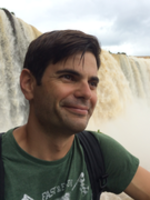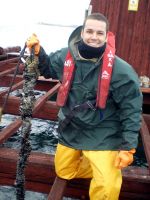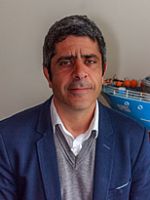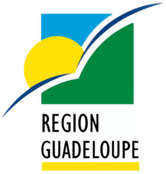
The Guadeloupe Regional Council is an assembly elected by Guadeloupeans, with competency in most sectors concerning the archipelago’s daily life and future: economic development, training, transports, land use planning, culture, sports, environment…
The Guadeloupe Regional Council goes beyond the mere State-assigned jurisdiction and promotes an agenda rooted in equal opportunity.
As a leading body, the Guadeloupe Regional Council fosters actions aimed at sustainably developing the territory, protecting biodiversity, supporting innovation, internationalising firms especially towards the Caribbean market, promoting intermodal and complementary transports solutions, as well as supporting research and higher education.
Our goal is to make a promising land out of our archipelago.

El Instituto Español de Oceanografía fue creado por Real Decreto de 17 de abril de 1914, es un organismo público de investigación (OPI) dedicado a la investigación en ciencias del mar, especialmente en lo relacionado con el conocimiento científico de los océanos, la sostenibilidad de los recursos pesqueros y el medio ambiente marino. El IEO depende del Ministerio de Economía y Competitividad, a través de la Secretaría de Estado de Investigación
El IEO no se limita a realizar investigación básica y aplicada, también asesora científica y tecnológicamente a las administraciones en asuntos relacionados con la oceanografía y las ciencias del mar. De hecho, según la Ley de Pesca Marítima de 2001, el IEO es el organismo investigador y asesor para la política sectorial pesquera del Gobierno. Además, es el representante científico y tecnológico de España en la mayoría de los foros y organismos internacionales relacionados con el mar y sus recursos.

IFREMER is a French institute that undertakes research and expert assessments to advance knowledge on the oceans and their resources, monitor the marine environment and foster the sustainable development of maritime activities.
IFREMER was created on 5 June 1984 when CNEXO and ISTPM merged.
Its missions were to conduct and promote basic and applied research as well as expert assessments and technological and industrial developments to:
- Study, assess and develop the ocean’s resources and their sustainable use,
- Improve methods to monitor, forecast and build stewardship to protect the oceans and enhance the value of the marine and coastal environment,
- Foster the socio-economic development of the maritime sector.
Some 30 years after its creation, IFREMER continues to pursue these very same goals.
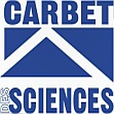
Créé en 1993, le Carbet des Sciences (association loi 1901) est le CCSTI de Martinique. Pourquoi le carbet ? C'est en référence à la case de palabre amérindienne traditionnelle appelé 'carbet'. En effet, le Carbet des Sciences se veut être cet espace où l'on diffuse, développe et discute de sciences.
Les progrès scientifiques, techniques et industriels ont entraîné, au cours des dernières décennies, des changements profonds de la vie des hommes. Ces progrès suscitent parfois des inquiétudes et le public aspire à être pleinement informé des avancées et des enjeux de la recherche scientifique et technologique. C’est la raison pour laquelle les responsables politiques de notre pays, comme bien d’autres à travers le monde, ont souhaité que les citoyens se réapproprient les choix scientifiques et technologiques et qu’ils puissent en débattre avec les acteurs et les décideurs.
Les Centres de Culture Scientifique, Technique et Industrielle (CCSTI) ont été créés à l’initiative du Ministère de la Recherche. Leur but est de favoriser un partage des savoirs en offrant au plus large public les moyens de s’informer et de réfléchir sur les évolutions scientifiques et techniques de notre temps. Depuis de nombreuses années, les CCSTI ont trouvé leur place dans le paysage de la diffusion et de la transmission du savoir. Le réseau des CCSTI compte aujourd’hui une trentaine de centres répartis sur l’ensemble du territoire qui assurent leur mission de diffusion de la culture scientifique auprès du grand public et des scolaires.

Founded in 2004 in FAIAL, AZORES, seaExpert lives the fishery in its various strands. Created to support AZOREAN ARTISANAL FISHING, we quickly extended our activity outside the region.
UNIQUE in the services we offer in Portugal, we develop continental or faraway fishing projects all across the Atlantic Ocean.
With a strong SCIENTIFIC BACKGROUND, we gained more experience along the way through competence, rigor and entrepreneurship spirit.
seaExpert has been broadening its horizons in the fishery and sea world in general, taking in account the SERVICES provided in the different Atlantic Fisheries Regional Organizations, EU DGMARE CONSULTING and other services provided for the Republic and the Azores Governments.
Always with INNOVATION and EXCELLENCE, seaExpert, with the University of the Azores partnership, also pioneered the aquaculture implementation and development in the Autonomous Region of the Azores, with several projects targeting barnacles and sea urchins production.
Recently, seaExpert established its commercial sector and started a new activity: the SEAWEED HARVEST for pharmaceutical, cosmetics and biotechnology industry in general, but also for the restaurant sector with the harvest of EDIBLE SEAWEEDS.
Like in everything we do, seaExpert’s seaweed harvest activity is conducted not only by biological, but social strict SUSTAINABILITY standards, respecting above everything else who allows us to live from the Sea – NATURE itself.
If you look for innovation, sustainability and dedication, then you have found the right partner!
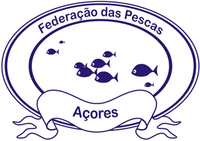
The Federation of Fisheries of the Azores (FPA) was founded in 2005, and arises from the will of the associative fishing movement in the Azores.
The FPA groups the 12 fisheries associations of the 9 islands of the Azores, and maintains permanent contacts with all its associates in the form of local or regional meetings.
Defending the interests of fishing in the Azores, in mainland Portugal and abroad, always safeguarding the social, environmental and economic component of this activity, in the defense of a dignified and quality life for all fishermen, are the objectives of the FPA.
The FPA works to alert and engage the Regional and the Republic Governaments, in the implementation of essential strategies and defending a fisheries policy that respects the codes of conduct for responsible and sustainable fishing.
The FPA assumes the representation of Azores at the European Commission, in Brussels, and the participation in all the fisheries forums. At the international level, the FPA is represented in the different Consultative Councils, in particular in the Outermost Regions.
Of the various technical services provided, FPA collaborates in actions for the valorisation of fishery products and the fishing community, for sensitization, education and vocational training, and in direct aid to fishing companies. The FPA creates mechanisms to bring together the several players in the fishing industry – from research to consumer.

Atlantic Environmental Research Center (Centro de Investigaciones Medioambientales del Atlántico, S.L.) is a marine environmental consultant which develops technical assistance, project management, analysis, and marine research.
Our services are specifically designed to develop research or give support in the marine environment. Aquaculture, Environmental Management, Cartography and Characterization of communities, Equipment Rental, Environmental Management and Analysis, Systematics and biological laboratory, Laboratory of chemical analysis, Oceanography, Marine ecology, Impact studies and Environmental Surveillance, Training/Education and Outreach plans.

Gestión del Medio Rural de Canarias, S.A.U. (GMR Canarias) es una sociedad mercantil pública adscrita a la Consejería de Agricultura, Ganadería, Pesca y Aguas.
En la actualidad, es medio instrumental y servicio técnico propio de la Administración Pública de la Comunidad Autónoma de Canarias, tal y como se reconoce en el Decreto 188/2001 del 15 de octubre, con el que se determina su finalidad de servir como instrumento para la ejecución de la política agropecuaria y pesquera del Gobierno de Canarias.
Su misión es la mejora del sector primario en línea con las estrategias de dicha institución, y sus actividades fundamentales se desarrollan en dos vertientes:
- Comercialización y promoción de productos canarios.
- Transferencia técnica al sector para profesionalizarlo y hacerlo más competitivo
Principales líneas de actuación de GMR Canarias
- Comercializar los productos agrarios originarios de Canarias a nivel regional.
- Promocionar los productos canarios en el Archipiélago.
- Apoyo a la exportación de productos agrarios originarios de Canarias.
- Fomentar el asociacionismo en el Sector.
- Prestación de trabajos, servicios y asistencias técnicas especializadas para la mejora del sector primario.

The Regional Secretariat for the Sea, Science and Technology is responsible for the management of one of the most important factors in the development of the Azores: the Sea
This department oversees the areas of fisheries and aquaculture, oceanographic exploration, sea-related activities, coastal areas and the cooperation with the Maritime Police. It is also in charge of coordinating the policies developed in the areas of Science and Technology in the Azores as well as the relation between the Regional Government and the University of the Azores, and other entities representing the Information Society.

We design and implement websites. No matter the size of the project. Even on the smallest ones, there is always a detail that will challenge us and will invite us to explore new territories. On the other hand, the largest projects (Yann-Arthus Bertrand, Cartier, BNP, Ministère de l'Environnement) give us the opportunity to demonstrate our design and technical master skills on complex websites.
As part of a longstanding collaboration with French State services (Ministère de l'Environnement, Ifremer, ...), we have developed several innovative products of interactive cartography.
We also work as project manager or technical architect on large projects.

















